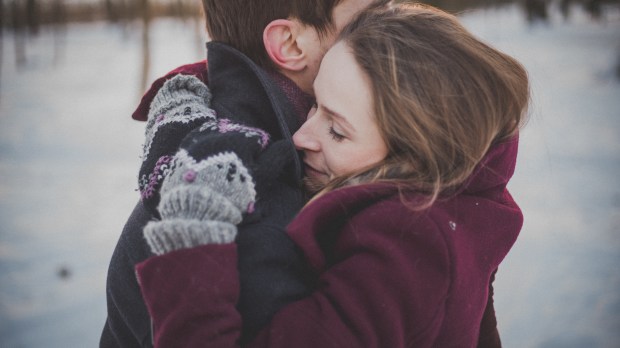My frustration continued to build as the time crept closer to 7 p.m. I had dinner waiting in the oven, a fussy toddler who was becoming increasingly difficult to entertain, and a husband I had thought would be home before 6 p.m., but whose phone was going straight to voicemail.
I knew that in all likelihood he had gotten caught up at work or stuck in traffic and his frequently malfunctioning phone had died once again.
Still, I felt foolishly dependent for sitting at the house and waiting. This is pathetic, I thought. If he doesn’t care enough to come home on time or contact me, I don’t care enough to wait around here for him.
With that, I scooped up the baby and headed out to pass time elsewhere. Later, when I finally returned home where he was waiting, I found out I’d been right. His phone had died late in the afternoon and his boss had called him into a meeting just when he’d been about to leave. I could tell he’d had a long day and had been looking forward to seeing us when he walked through the door.
As I lay in bed that night, still confident in my choice to let him come home to an empty house, I was struck by a quote on Pinterest: “Don’t be afraid to be the one who loves the most.” Intrigued, I followed the link to a website called The Loveumentary and learned that those words had come from an 80-year-old named Anne Gaston. While being interviewed by writer Nate Bagley, who was collecting marriage advice for millennials for a book, Anne and her husband had been asked what love advice they could offer after 60 years of marriage. Anne’s answer was vulnerable and brave all at once, and it resonated powerfully with her interviewer, Bagley.
Reading all this, I found myself similarly impacted. And then a little ashamed, as the realization sunk in that my actions earlier had been in direct opposition to a willingness to love more. Instead, I had acted out of fear—fear of being the one who did more, waited more, was available more, loved more. Why? Because I believed being that person meant being weak.
In his writing, Bagley noted that, sadly, most of us are conditioned to believe that whoever cares less in a relationship is happier and freer. But, after his interview with Anne, Bagley now passionately believes that seeing love as a weakness is fault logic: “Loving someone more than they love you is not stupid or crazy or foolish. It’s the bravest thing you can do in this life.” And he argues that the freedom we’re looking for actually comes when we allow ourselves to love another person more: “Love is the fuel that makes relationships work,” he says. “True love is given without conditions or expectation of reciprocation.”
That means giving even without the guarantee of getting, I realized. It means waiting for your spouse, even when they’re late, because you’re excited to see him again. It means giving them your heart, and trusting that they’ll take care of it.
After letting this new philosophy sink in, I spoke to my husband’s 95-year-old grandfather, who has been happily married for 75 years. When I asked him about the key to his happy marriage, he replied: “Patience. When I was away for two years during the war and she was raising our daughter, I’m sure she didn’t always feel like waiting for me. She was patient, though, thank God.”
His answer, similar to Anne’s, moved me. If his wife could wait lovingly for two years, I could certainly wait for an extra hour at the end of the day. If anything, I ought to have seen it as an opportunity to love him more by making him my priority. It’s not an easy thing to do, especially in moment of vulnerability when I feel like I’m not his priority. But the payoff is greater.
Bagley states, “When we aren’t afraid to be the one who loves the most, and we find a partner who is also committed to loving big, we get the experience of receiving love even (and especially) in the moments we least deserve it.”
There is no doubt in my mind now: that kind of love is worth the wait.

